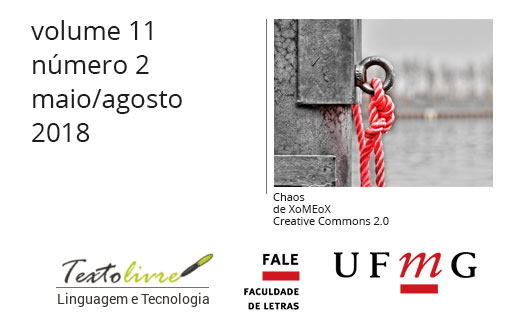Quando eu sou o Outro: problemas de ethos e identidade no filme Pequeno Grande Homem
DOI:
https://doi.org/10.17851/1983-3652.11.2.1-17Palavras-chave:
Pequeno Grande Homem, outro, ethos, identidade, faroesteResumo
RESUMO: Este artigo pretende estudar a relação da construção do ethos e da identidade no personagem principal do filme Pequeno Grande Homem (Little Big Man, 1970) de Arthur Penn, além de salientar as representações do Outro (os nativos norte-americanos) na narrativa fílmica. Através de um encontro interdisciplinar entre componentes da Análise do discurso (AD), da linha francesa de Maingueneau, e os estudos culturais, propomos uma visão mais ampla sobre a questão do eu e do Outro no gênero de faroeste. Os referencias teóricos estão focados em Tzvetan Todorov e Stuart Hall, para analisarmos a questão do Outro, a cultura e a identidade. Para enveredarmos na temática do ethos, buscamos teorias do discurso baseadas nos estudos de Dominique Maingueneau, que, por sinal, pertencem à linha de pesquisa da AD de linha francesa. Pretendemos, através deste estudo, problematizar a questão do Outro, entendendo que o personagem principal do filme desconstrói um ethos pré-discursivo, estabelecido na cultura norte-americana, em que a tradição via o nativo como selvagem e bestial.
PALAVRAS-CHAVE: Pequeno Grande Homem; outro; ethos; identidade; faroeste.
ABSTRACT: This paper intends to analyze the relation of ethos and identity construction in the protagonist of the film Little Big Man (Arthur Penn, 1970), besides stressing out the representations of the Other (the North American natives) in the filmic narrative. Through an interdisciplinary approach between components of the Discourse Analysis from the French studies of Maingueneau, and cultural studies, we propose a substantial vision about the matter of the other and I in the western genre. The theoretical references are focused on Tzvetan Todorov and Stuart Hall, to analyze the matter of the other, culture and identity. To analyze the discursive ethos, we relied on discourse theories based on the studies of Dominique Maingueneau, that, by the way, belong to the French Discourse Analysis. Through this study, we intend to problematize the issue of the other, understanding that the protagonist of the film deconstructs a pre-discursive ethos, established on the North American culture, where tradition saw the native as a savage.
KEYWORDS: Little Big Man; other; ethos; identity; western.
Downloads
Referências
CASSIRER, E. Linguagem e mito. São Paulo: Perspectiva, 2013.
FANON, F. Pele negra, máscaras brancas. Salvador: EDUFBA, 2008.
HALL, S. A identidade cultural na pós-modernidade. Rio de Janeiro: DP&A, 2001.
JENKINS, K. A História repensada. São Paulo: Contexto, 2013.
KEMP, P. Tudo sobre cinema. Rio de Janeiro: Sextante, 2011.
KORD, S.; KRIMMER, E. Contemporary Hollywood masculinities: gender, genre, and politics. Nova York: Palgrave Macmillan, 2011.
MAINGUENEAU, D. A propósito do ethos. In: MOTTA, A. R.; SALGADO, L. (Org.) Ethos discursivo. São Paulo: Contexto, 2008a.
MAINGUENEAU, D. Cenas da enunciação. São Paulo: Parábola, 2008b.
MAINGUENEAU, D. Discurso literário. São Paulo: Contexto, 2014.
PEQUENO Grande Homem. Direção: Arthur Penn. Produção: Stuart Millar. Los Angeles: Stuart Millar & Arthur Penn productions, 1970 (139 min.) Disponível em: https://www.youtube.com/watch?v=r46UERKGeLk. Acesso em: 10 jun. 2018.
TODOROV, T. A conquista da América: a questão do outro. São Paulo: Martins Fontes, 2003.
Downloads
Publicado
Edição
Seção
Licença
Copyright (c) 2018 Texto Livre: Linguagem e Tecnologia

Este trabalho está licenciado sob uma licença Creative Commons Attribution 4.0 International License.
Este é um artigo em acesso aberto que permite o uso irrestrito, a distribuição e reprodução em qualquer meio desde que o artigo original seja devidamente citado.











